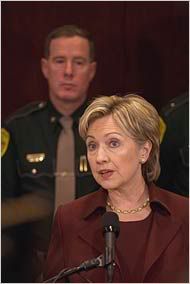From Crisis Standpoint, Hillary Blew It
 An unfortunate sidebar of being an experienced communicator is having to deal with crises -- deaths of well-known people, restaurant poisonings, corporate crimes or stupidity, natural disasters -- so I'm reading the post-hostage taking Hillary coverage with an attentive, if jaded, eye.
An unfortunate sidebar of being an experienced communicator is having to deal with crises -- deaths of well-known people, restaurant poisonings, corporate crimes or stupidity, natural disasters -- so I'm reading the post-hostage taking Hillary coverage with an attentive, if jaded, eye.The media seems to think she did stellarly:
- The hostage-taking itself offered a rare, if small, genuine drama in a campaign season governed by strict schedules and scripted stump speeches.
The scene was one of a woman in charge.
It looked and sounded presidential,” said Larry Sabato, director of the University of Virginia Center for Politics. “This was an instance of the White House experience of this campaign. They knew how to handle this.” (Politico) - When the hostages had been released and their alleged captor arrested, a regal-looking Hillary Rodham Clinton strolled out of her Washington home, the picture of calm in the face of crisis. (AP)
Tactically, it was important for the hostage taker, Leeland Eisenberg, not be given the opportunity to talk to Clinton, but that did not mean she had to be miles from the scene. I seem to recall torrents of criticism directed at President Bush for not being at the scene of Katrina, but Hillary skated with laudatory references to her regal and presidential character. (I'll have none of the former, please; this is America.)
Why isn't the press demanding to know why she hid herself away in the New York suburbs instead of being there for her faithful employees in their time of need?
Why aren't they asking why she cowered or hid (using words that probably would have been applied to Bush in a similar situation) instead of being visible? She was under no personal threat.
Why isn't her senior staff being grilled? Can you imagine the questions being directed at a Karl Rove or Andy Card if the sensible pump were on the other foot?
It's not just that; it's that Hillary missed one one singular, golden opportunity to appear ... warm. Here's how it could have played out:
Upon hearing the news, Hillary cancels her speech, leaves Virginia and flies to New Hampshire. The press has not been traveling in her bus or plane, so they easily enough could have been misled by a press secretary who refuses to disclose her location but hints that it's not New Hampshire.
Once in New Hampshire -- perhaps arriving in a wig and dark glasses in an unmarked car -- she goes to a private place near the scene, where she meets with the hostages' families, giving them encouragement and strength, and talks by cell phone with law enforcement officials.
Then, when the negotiations succeed and all is well, the first person to greet her traumatized workers, under the glare of the cameras, could have been Hillary Rodham Clinton, a tear sneaking its way down her cheek, but strong, commanding and compassionate as she gives them the kind of comfort she wants to extend to all of us Americans.
(This of course assumes Hillary would be able to act like a warm, compassionate human for a prolonged period of time.)
But instead of taking any risk, she thought too much about options: What if the negotiations drag on and I miss a fund-raiser? What if it all ends horribly; do I want to be there?
Pshaw. On a risk/reward scale, this one was overwhelmingly tilted toward reward; especially if things did start going very badly and she could have been there to talk to Eisenberg.
She played it safe, took no risks, and got praised by a fawning media. Not a bad result, but if she'd played by my playbook, she could have been unbeatable.
Update: Ann Althouse writes well on the subject, too.
hat-tip: memeorandum




<< Home